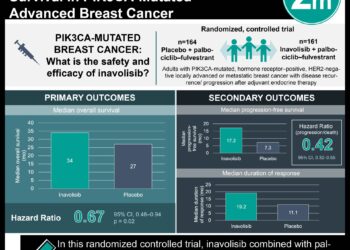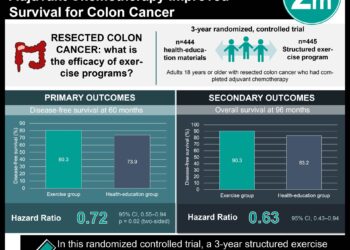Intraperitoneal chemotherapy improves advanced ovarian cancer survival [Classics Series]
This study summary is an excerpt from the book 2 Minute Medicine’s The Classics in Medicine: Summaries of the Landmark Trials
1. Women with advanced-stage (≥Stage III) ovarian cancer randomized to intraperitoneal chemotherapy achieved an increase in overall survival compared to controls.
Original Date of Publication: January 2006
Study Rundown: Ovarian cancer is the most deadly gynecologic malignancy. Due to nonspecific presenting symptoms and disease predilection for early intraabdominal spread via peritoneal lymphatics, the majority of patients present with advanced-stage disease. As of the early 2000s, the standard of care for women with advanced disease involved optimal tumor reductive surgery, defined as resection of all disease > 1 cm, followed by adjuvant intravenous chemotherapy. The most common chemotherapy regimen involved 6 cycles of paclitaxel and a platinum analogue, such as cisplatin. The peritoneal cavity is the primary site of disease in ovarian cancer, which triggered researchers to postulate that applying chemotherapy locally to the peritoneal cavity might improve disease response and decrease toxicities associated with intravenous chemotherapy. Previous trials comparing intravenous only (IV) versus intravenous plus intraperitoneal (IV/IP) chemotherapy produced mixed results: one demonstrated a significant survival advantage in the IV/IP group while another showed an improvement in the progression-free interval but not survival.
This landmark Phase 3 clinical trial compared the standard of care, IV cisplatin/paclitaxel, to IV paclitaxel with IP cisplatin/paclitaxel and found that the IV/IP regimen was associated with increase in both progression-free survival and overall survival. However, the minority (< 50%) of patients in the IV/IP group completed 6 cycles of treatment due to toxicities including fatigue, pain and neurologic side effects. Findings changed clinical practice such that patients with advanced-stage ovarian cancer who seek to maximize survival at the cost of an increased risk of treatment-associated toxicities are now offered IP chemotherapy. Strengths included parsimonious, multicenter, randomized controlled trial through the Gynecologic Oncology Group (GOG). Central review of the complete medical record by GOG physician-scientists permitted adherence to strict inclusion and exclusion criteria. Findings are limited by a low completion rate of IV/IP regimen due to toxicities, which may bias results toward the null.
Click to read the study in NEJM
In-Depth [randomized controlled trial]: A total of 415 women with Stage III ovarian carcinoma or primary peritoneal carcinoma who underwent optimal tumor reductive surgery (no residual mass greater than 1.0cm) were randomized to receive intravenous cisplatin/paclitaxel (“IV,” n = 210) or intravenous paclitaxel followed by intraperitoneal cisplatin/paclitaxel (“IV/IP,” n = 205) for 6 cycles of chemotherapy occurring every three weeks at one of the Gynecologic Oncology Group (GOG) clinical centers across the United States (Columbus, New York, Irvine, Philadelphia, Oklahoma, Baltimore). Primary outcome was duration of overall survival. Secondary outcomes included progression-free survival, quality of life and treatment-associated toxicities.
Among women with Stage III ovarian cancer who underwent optimal tumor reductive surgery, those randomized to IV/IP chemotherapy experienced an increased duration of overall survival (67 vs. 50 months, p = 0.03) and a longer progression-free survival (24 vs. 18 months, p = 0.05) compared to those randomized to IV chemotherapy. Compared to women receiving standard IV chemotherapy alone, women in the IV/IP group were more likely to report toxicities including fatigue, pain and neurologic side effects but experienced a similar quality of life 1 year after treatment.
Armstrong DK, Bundy B, Wenzel L, Huang HQ, Baergen R, Lele S, et al. Intraperitoneal cisplatin and paclitaxel in ovarian cancer. The New England Journal of Medicine. 2006;354(1):34-43.
©2022 2 Minute Medicine, Inc. All rights reserved. No works may be reproduced without expressed written consent from 2 Minute Medicine, Inc. Inquire about licensing here. No article should be construed as medical advice and is not intended as such by the authors or by 2 Minute Medicine, Inc









